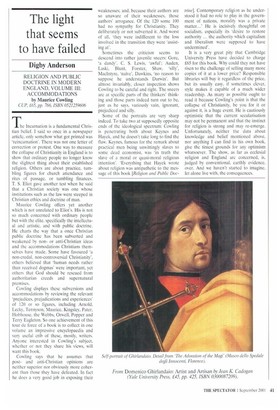The light that seems to have failed
Digby Anderson
RELIGION AND PUBLIC DOCTRINE IN MODERN ENGLAND, VOLUME III: ACCOMMODATIONS by Maurice Cowling CUP, £65, pp. 766, ISBN 0521259606 he Incarnation is a fundamental Christian belief. I said so once in a newspaper article, only somehow what got printed was 'reincarnation'. There was not one letter of correction or protest. One way to measure the collapse of Christianity in England is to show that ordinary people no longer know the slightest thing about their established religion. Others are about practice, tumbling figures for church attendance and rites of passage, or tumbling finances. T. S. Eliot gave another test when he said that a Christian society was one whose institutions such as the law were steeped in Christian ethics and doctrine of man.
Maurice Cowling offers yet another which is not unrelated to Eliot's. His is not so much concerned with ordinary people but with the elite, specifically the intellectual and artistic, and with public doctrine. He charts the way that a once Christian public doctrine has been subverted and weakened by nonor anti-Christian ideas and the accommodations Christians themselves have made, Some have favoured 'a non-credal. non-controversial Christianity', others believed that 'human needs rather than received dogmas' were important, yet others that God should be rescued from authoritarian creeds and supernatural premises.
Cowling displays these subversions and accommodations by reviewing the relevant 'prejudices, prejudications and experiences' of 120 or so figures, including Arnold, Lecky, Tennyson, Maurice, Kingsley, Pater. Hobhouse, the Webbs, Orwell. Popper and Terry Eagleton. So one achievement of this tour de force of a book is to collect in one volume an impressive encyclopaedia and very useful crib of these, mostly, writers. Anyone interested in Cowling's subject, whether or not they share his views, will want this book.
Cowling says that he assumes that postand anti-Christian opinions are neither superior nor obviously more coherent than those they have defeated. In fact he does a very good job in exposing their
weaknesses; and, because their authors are so unaware of their weaknesses, those authors' arrogance. Of the 120 some 100 had no sympathy for Christianity. They deliberately or not subverted it. And worst of all, 'they were indifferent to the loss involved in the transition they were 'assisting at'.
Sometimes the criticism seems to descend into rather juvenile sneers: Gore, 'a dandy', C. S. Lewis, `awful'; Auden, Laski, Blunt, Forster, Shaw, 'silly', MacIntyre, 'naive', Dawkins, 'no reason to suppose he understands Darwin'. But almost invariably, closer inspection shows Cowling to be careful and right. The sneers are at specific parts of the thinkers' thinking and those parts indeed turn out to be, just as he says, variously vain, ignorant, prejudiced and silly.
Some of the portraits are very sharp indeed. To take two at supposedly opposite ends of the ideological spectrum: Cowling is penetrating both about Keynes and Hayek, and he doesn't take long to find the flaw. Keynes, famous for the remark about practical men being unwittingly slaves to some dead economist, was 'in truth the slave of a moral or quasi-moral religious intention'. 'Everything that Hayek wrote about religion was antipathetic to the message of this book [Religion and Public Doc
trine]. Contemporary religion as he understood it had no role to play in the government of nations, morality was a private matter...' He is incisively thoughtful on socialism, especially its 'desire to restore authority ... the authority which capitalism and liberalism were supposed to have undermined'.
It is a very great pity that Cambridge University Press have decided to charge £65 for this book. Why could they not have risen to the challenge of selling many more copies of it at a lower price? Responsible libraries will buy it regardless of the price, but its usually easy, if sometimes clever, style makes it capable of a much wider readership. As many as possible ought to read it because Cowling's point is that the collapse of Christianity, be you for it or against it, is a huge event. He is cautiously optimistic that the current secularisation may not be permanent and that the instinct for religion is strong and may re-emerge. Unfortunately, neither the data about knowledge and belief mentioned above, nor anything I can find in his own book, give the tiniest grounds for any optimism whatsoever. The show, as far as ecclesial religion and England are concerned, is, judged by conventional, earthly evidence, over. And we haven't started to imagine, let alone live with, the consequences.


























































 Previous page
Previous page